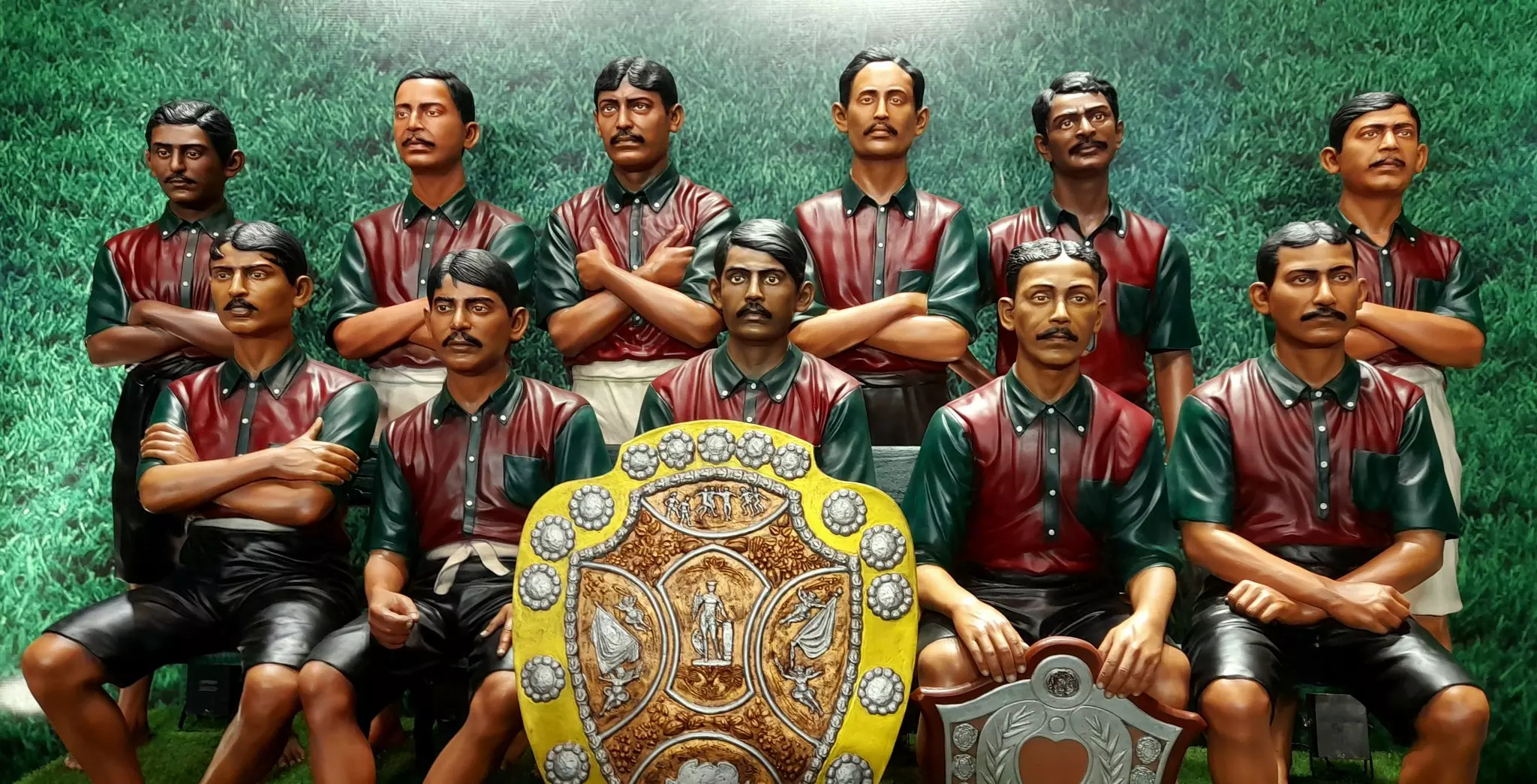Football
A Football ‘Lagaan’: How Mohun Bagan's 'Immortal Eleven' inspired the nation
Mohun Bagan's triumph in 1911 became a symbol of resistance, inspiring a nation yearning for independence.

The Statue of the Immortal XI at the Mohun Bagan Football Club (Photo Credits: @Iamchsudeep on X)
On July 29, 1911, a group of eleven Indian footballers, defying the colonial shackles, scripted a historic victory that would forever be etched in the annals of Indian sports.
Mohun Bagan in the early 1900s was coached by the legendary Silen Basu, a soldier, and the club's then-secretary. Under him, they instilled a rigorous military discipline into the Mohun Bagan team.
His coaching methods, characterized by intense physical conditioning, transformed the club into a formidable force which resulted in the Mariners defeating both British and Indian club sides regularly.
Their continuous dominance in the local circuit earned them a coveted spot in the IFA Shield tournament which was the third oldest tournament in India after the Durand Cup and the Trades Cup.
Mohun Bagan went on a stellar run of form in the tournament where they defeated St.Xavier's (3-0), Rangers (2-1), Rifle Brigade(1-0) & Middlesex Regiment(1-1;3-0) on their quest of the prestigious IFA Shield trophy.
By then, Mohun Bagan had become the symbol of oppression against the Colonial regiment.
It was a sunny day in Kolkata, Thousand of Mohun Bagan supporters rushed to the Calcutta Maidaan to support their beloved football clubs.
Due to the huge turnout, the East Indian railways had to provide special train services to cater to the needs of the tens and thousands of people traveling to the city.
The final garnered significant international attention, with leading British newspapers like The London Times, Daily Mail, and Manchester Guardian covering the game in great detail.
On the day of the finals, the whole team visited the famous Kalighat temple to seek the blessing of the goddess of power- a popular tradition in Bengal. The moment arrived, the Mariners were playing against the East Yorkshire regiment who were based in Ghaziabad in the finals.
The game commenced, it was a very hard ground where the ‘barefooted’ Mohun Bagan players matched the British counterparts in every aspect of a pacy, end-to-end football game.
Every Bagan attack received thunderous cheers from the crowd. In the early minutes of the game, Jackson from East Yorkshire gave the visitors the much-needed lead from a freekick.
Mohun Bagan players held their nerve and tried to remain calm after this early setback, soon Captain Shibas Baduri also known as “Pichol babu” or “Mr Slippery” equalized within 20 minutes giving life back to the crowd.
There was nothing to separate both sides till the 86 minutes when both teams had their fair share of chances but couldn’t capitalize.
In the 87th minute, A timely goal from Abhilash Ghosh set up by the captain himself, proved to be the difference-maker earning them a hard-fought win for his team.
At the final whistle, a thunderous roar erupted from the Calcutta crowd as fireworks started to light the skies in celebration.
Reuters reported that "the magnitude of the crowd was so enormous that the scorers found it difficult to announce the scores, which forced them to broadcast in the form of Kites in the sky.
The stadium after the winning goal, instantly was transformed into a chaotic scene as enthusiastic fans tossed their shirts, sticks, and shoes into the air.
The English team hastily retreated as the stadium reverberated with chants of "Bande Mataram" and "Mohun Bagan ki Jay."
As the victorious Mohun Bagan team paraded through the city, A resident, gazing at the Union Jack flying atop Fort William, inquired. " When will that come down? "
In response, a voice echoed, "It shall descend when Mohun Bagan triumphs again."
Quite remarkably, this prediction aligned when the Mohun Bagan won the shield again in 1947, the same year when India declared their Independence from British rule. A prophetic omen which was written in the stars.
The eleven players became national heroes overnight and were named the 'Amor Ekadosh', which translates to 'The Immortal Eleven' in Bengali.
The win also fuelled India’s freedom movement and Calcutta was slowly becoming a less hospitable place for the British who then changed their capital to Delhi.
Who were the Immortal XI
Shibdas Bhaduri (Capt.), Hiralal Mukherjee, Bhuti Sukul, Sudhir Chatterjee, Manmohan Mukherjee, Rajen Sengupta, Nilmadhav Bhattacharya, Kanu Roy, Habul Sarkar, Abhilash Ghosh, and Bijoydas Bhaduri.
In 2023, Mohun Bagan unveiled the historic statue dedicated to the Immortal XI, along with the heritage bench on which these players sat during the match. The day on which this game happened, July 29, is still being celebrated as 'Mohun Bagan Day'.
Achinta Kumar Sengupta in his ' Kollol Jug' added," Mohun Bagan is not a football team. It is a tortured country, rolling in the dust, which has just started to rise its head."
More than just a football triumph, Mohun Bagan's victory stands as a powerful symbol of Indian resilience against colonial oppression in a sport that they invented!
